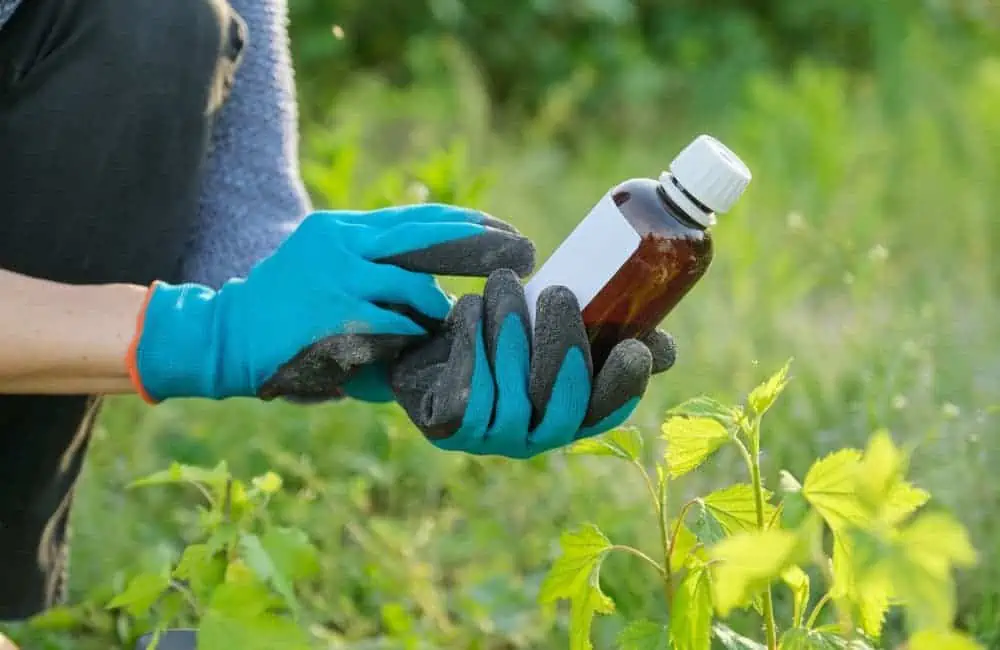Is Paraquat Banned in the U.S.?
- Last Updated: July 27th, 2023

Attorney Jessica Paluch-Hoerman, founder of TruLaw, has over 28 years of experience as a personal injury and mass tort attorney, and previously worked as an international tax attorney at Deloitte. Jessie collaborates with attorneys nationwide — enabling her to share reliable, up-to-date legal information with our readers.
Legally Reviewed
This article has been written and reviewed for legal accuracy and clarity by the team of writers and legal experts at TruLaw and is as accurate as possible. This content should not be taken as legal advice from an attorney. If you would like to learn more about our owner and experienced injury lawyer, Jessie Paluch, you can do so here.
Fact-Checked
TruLaw does everything possible to make sure the information in this article is up to date and accurate. If you need specific legal advice about your case, contact us by using the chat on the bottom of this page. This article should not be taken as advice from an attorney.
Is Paraquat Banned in the U.S.?
Paraquat, which first became widely used in the 1960s, is an herbicide that has been used on many different crops for decades.
It is also incredibly toxic and can cause death in humans who consume even a small sip of the herbicide.
Exposure to paraquat has also been linked to Parkinson’s disease and other severe illnesses.

While paraquat was legal for use by anyone in the United States for more than half a century, that recently changed.
Today, purchasing and using herbicides that contain paraquat is prohibited by the Environmental Protection Agency (EPA) unless the user has special certification and training.
Although it is not banned entirely, it is currently classified as a “restricted use” product.
Another highly controversial herbicide, Roundup, remains legal, although health concerns related to the use of Roundup have led many farmers to use paraquat products.
Table of Contents
Negative Health Effects of Paraquat
Studies have shown that exposure to paraquat is directly linked to an increased risk of contracting Parkinson’s disease.
Parkinson’s disease is a nervous system disorder that causes symptoms such as tremors or palsy which turns into reduced mobility and muscle stiffness as the disease progresses.
Per research cited by the Unified Parkinson’s Advocacy Council, which is led by the Michael J. Fox Foundation for Parkinson’s Research (MJFF), young people, including teens and young adults, are 200 percent to 600 percent more likely than the average person to develop Parkinson’s disease later in life after exposure to paraquat.
The percentage of risk regarding Parkinson’s disease is dependent on the individual’s level of exposure to the toxic chemical.
The Council also cited the Agricultural Health Study, which showed that farmers who either mixed or applied the herbicide were also at an increased risk of developing Parkinson’s disease later in life.
Farmers who were regularly exposed to products containing paraquat were 200 percent more likely to contract Parkinson’s disease, and certain gene defects increased the risk even further.
Other possible severe and debilitating consequences of paraquat exposure include brain damage, kidney damage, liver damage, lung damage, birth defects, miscarriages, heart conditions, heart failure, and in the most severe cases, death.
Why Paraquat Has Been Banned for General Use in the United States
Even though the herbicide has been banned in many countries, including Brazil, Kuwait, Malaysia, Switzerland, the United Kingdom, and European Union nations, the United States has continued to allow paraquat use with restrictions.
The EPA decided to ban paraquat, made by many different manufacturers and sold under many different brand names, for general use due to its level of toxicity and potential for causing severe health conditions in humans if swallowed or inhaled.
In fact, according to the EPA, there have been 17 fatalities (including three children) caused by accidental paraquat ingestion since 2000.
These fatalities occurred after the herbicide was transferred from its container to a beverage container, which the victim assumed was safe to drink.
There have also been fatalities and severe injuries associated with skin exposure to paraquat.
In addition to restricting the use of this hazardous herbicide to licensed applicators, paraquat purchased in the United States contains a blue dye.
The purpose of the blue dye is to prevent commercially licensed farmers and certified agricultural workers from confusing the herbicide with beverages, such as coffee.
Paraquat sold in the U.S. also contains an agent that induces vomiting if the user accidentally consumes it, as well as a strong odor to prevent applicators from mistaking it for something else.
Who Can Legally Purchase and Use Paraquat?

Because the EPA has categorized paraquat as a restricted-use chemical due to its toxic nature, only certain people are allowed to use and apply paraquat, including commercially licensed individuals and trained agricultural workers.
When using paraquat, licensed applicators should wear long-sleeved shirts, gloves, safety goggles, and a mask to prevent exposure to the herbicide.
The Centers for Disease Control (CDC) created a list of potential respirators that can be used for additional security when using and applying paraquat dichloride.
These respirators are specifically designed to prevent exposure to certain dangerous chemicals, including paraquat.
People who wish to become licensed applicators can find out more about the certification process by visiting the EPA’s website.
Individuals who are not licensed by the EPA, including uncertified individuals working under licensed applicators, are not allowed to use, mix, apply, or load paraquat or interact with the herbicide in any other way.
Such actions are against the law and can be subject to legal action.
Paraquat Lawsuits
Individuals who developed Parkinson’s disease or another serious illness after paraquat exposure have been filing lawsuits against various paraquat manufacturers in the United States.
People who mixed, loaded, sprayed, or applied paraquat, as well as individuals who lived near farmland where paraquat was frequently used, could be eligible to pursue compensation for damages they suffered as a result of exposure to the herbicide.
The plaintiffs in paraquat lawsuits are alleging that the manufacturers of the herbicide, which include Chevron and Syngenta, failed to warn agricultural workers, farmers, and others about the risks associated with using and applying the product.
Lawsuits are currently making their way through the courts.
If you would like to learn more about whether you are eligible to file a lawsuit against the manufacturers of paraquat, use our Instant Case Evaluation tool to get in touch with TruLaw.

Managing Attorney & Owner
With over 25 years of legal experience, Jessica Paluch-Hoerman is an Illinois lawyer, a CPA, and a mother of three. She spent the first decade of her career working as an international tax attorney at Deloitte.
In 2009, Jessie co-founded her own law firm with her husband – which has scaled to over 30 employees since its conception.
In 2016, Jessie founded TruLaw, which allows her to collaborate with attorneys and legal experts across the United States on a daily basis. This hypervaluable network of experts is what enables her to share the most reliable, accurate, and up-to-date legal information with our readers!
Here, at TruLaw, we’re committed to helping victims get the justice they deserve.
Alongside our partner law firms, we have successfully collected over $3 Billion in verdicts and settlements on behalf of injured individuals.
Would you like our help?
At TruLaw, we fiercely combat corporations that endanger individuals’ well-being. If you’ve suffered injuries and believe these well-funded entities should be held accountable, we’re here for you.
With TruLaw, you gain access to successful and seasoned lawyers who maximize your chances of success. Our lawyers invest in you—they do not receive a dime until your lawsuit reaches a successful resolution!
AFFF Lawsuit claims are being filed against manufacturers of aqueous film-forming foam (AFFF), commonly used in firefighting.
Claims allege that companies such as 3M, DuPont, and Tyco Fire Products failed to adequately warn users about the potential dangers of AFFF exposure — including increased risks of various cancers and diseases.
Depo Provera Lawsuit claims are being filed by individuals who allege they developed meningioma (a type of brain tumor) after receiving Depo-Provera birth control injections.
A 2024 study found that women using Depo-Provera for at least 1 year are five times more likely to develop meningioma brain tumors compared to those not using the drug.
Suboxone Tooth Decay Lawsuit claims are being filed against Indivior, the manufacturer of Suboxone, a medication used to treat opioid addiction.
Claims allege that Indivior failed to adequately warn users about the potential dangers of severe tooth decay and dental injuries associated with Suboxone’s sublingual film version.
Social Media Harm Lawsuits are being filed against social media companies for allegedly causing mental health issues in children and teens.
Claims allege that companies like Meta, Google, ByteDance, and Snap designed addictive platforms that led to anxiety, depression, and other mental health issues without adequately warning users or parents.
Transvaginal Mesh Lawsuits are being filed against manufacturers of transvaginal mesh products used to treat pelvic organ prolapse (POP) and stress urinary incontinence (SUI).
Claims allege that companies like Ethicon, C.R. Bard, and Boston Scientific failed to adequately warn about potential dangers — including erosion, pain, and infection.
Bair Hugger Warming Blanket Lawsuits involve claims against 3M — alleging their surgical warming blankets caused severe infections and complications (particularly in hip and knee replacement surgeries).
Plaintiffs claim 3M failed to warn about potential risks — despite knowing about increased risk of deep joint infections since 2011.
Baby Formula NEC Lawsuit claims are being filed against manufacturers of cow’s milk-based baby formula products.
Claims allege that companies like Abbott Laboratories (Similac) and Mead Johnson & Company (Enfamil) failed to warn about the increased risk of necrotizing enterocolitis (NEC) in premature infants.
Here, at TruLaw, we’re committed to helping victims get the justice they deserve.
Alongside our partner law firms, we have successfully collected over $3 Billion in verdicts and settlements on behalf of injured individuals.
Would you like our help?








